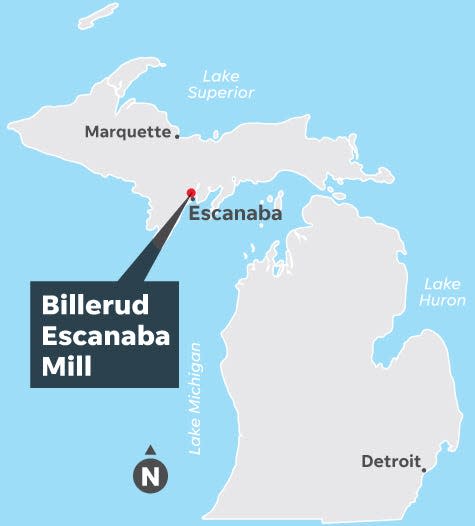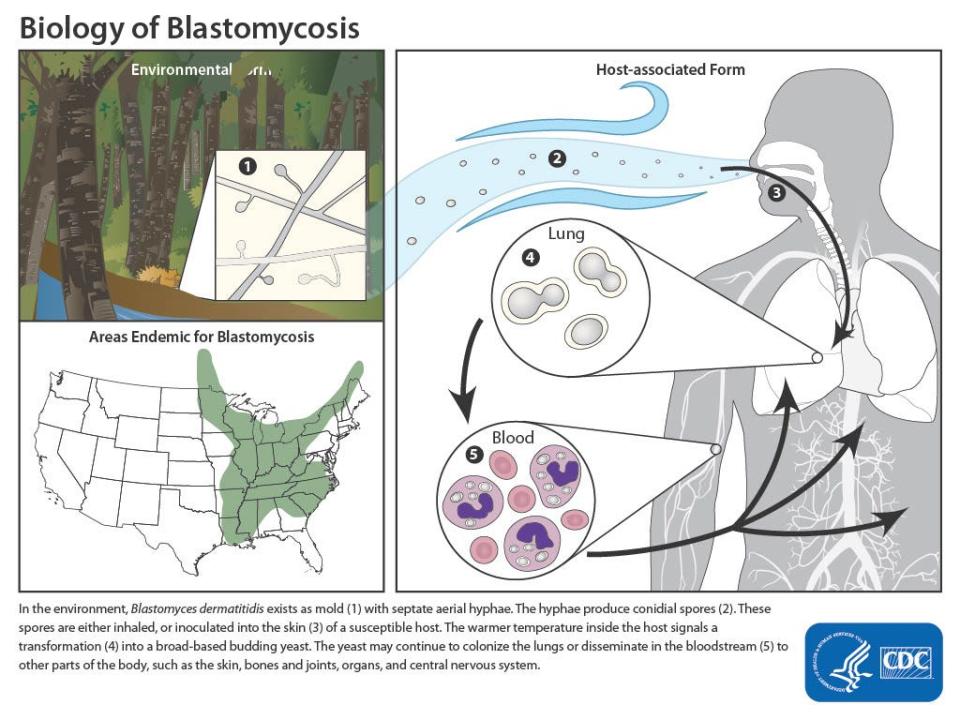Escanaba paper mill reopens after mysterious blastomycosis outbreak, investigation
After being closed for more than three weeks for deep cleaning and investigation of a mysterious blastomycosis fungal infection outbreak, the Billerud paper mill in Escanaba is back to full operation.
The Swedish-based company announced its reopening Monday on its website after the closing related to the blastomycosis outbreak, escanabamillinfo.com.

"To date, no Blastomyces spores have been found within the mill," company officials stated. "The health and safety of our employees and contractors remains our top priority and we are focused on ensuring a safe return to the mill. We continue to work closely with and follow the recommendations of local, state, and federal health experts as they continue to investigate this dynamic situation."
The resumption of production at the paper mill, Michigan's largest manufacturing employer north of Midland with more than 800 employees, comes as the local health department announced an increase of six blastomycosis cases over the past week, to a total of 115. At least 14 of those infected required hospitalization, with one, a contractor from Gladstone, dying from the disease last month. All of the cases are either employees, contractors or visitors to the Billerud Escanaba mill.

The uptick in cases does not necessarily mean Blastomyces exposures are ongoing, said Michael Snyder, health officer with Public Health Delta and Menominee Counties, in a statement.
"Due to the lengthy incubation time — the time from exposure to the fungus to the time one starts to show symptoms of blastomycosis — it is likely all cases had an exposure prior to the mill idling operations," he said. The incubation period varies from person to person, and can be three weeks to three months, he said.
The Billerud blastomycosis outbreak is the largest of its kind in an industrial setting in U.S. history. How it occurred is still a mystery, as the fungal disease is almost never spread from person to person. That could indicate that all of those infected were exposed to the same Blastomyces spore-containing materials at some point earlier this year. Workers began falling ill with the disease in February, and public health officials recognized it as an outbreak by early March.
More: As mystery of Escanaba paper mill's blastomycosis outbreak deepens, its victims try to heal
In addition to the local health department, agencies investigating the outbreak include the Michigan Department of Health and Human Services and the U.S. Centers for Disease Control and Prevention's National Institute for Occupational Safety and Health.
Billerud is making N95 protective masks available to employees as a precautionary measure.

According to the CDC, people contract blastomycosis after breathing in microscopic Blastomyces fungal spores from the air, often after participating in activities that disturb the soil. The spores can be found throughout the eastern U.S. and parts of Canada, including in Michigan's Upper Peninsula.
Once inside the lungs, the body's warmth and moisture can transform the spores into yeast that can stay in the lungs or be transferred through the bloodstream to other parts of the body, including the skin, bones, joints, organs, brain and spinal cord.
Some exposed to the spores will exhibit no symptoms. For others, symptoms of blastomycosis often mirror a cold or flu — cough, fever, body aches, night sweats. But for some, the disease can result in serious illness or death.
States that track blastomycosis report only about one or two cases per 100,000 population a year. Deaths from the disease are similarly rare, with the CDC finding 1,216 blastomycosis-related deaths occurred in the U.S. from 1990 to 2010, an average of about 61 per year nationwide.
"Blastomycosis is treatable with antifungal medicines, but it is important to get diagnosed early," Snyder said. Antifungal treatments may be necessary for six months to a year, depending on the severity of the infection and a person's immune status, he said.

In January, the Legislature and Gov. Gretchen Whitmer approved a $200 million state grant to help the Billerud Escanaba mill convert from producing magazine and catalog paper to paperboard like that used in consumer product boxes. The more than $1 billion retooling of the plant, which is expected to keep it one of the region's largest, best-paying employers for years to come, is slated for completion by 2029, according to Billerud's website.
Contact Keith Matheny: kmatheny@freepress.com.
This article originally appeared on Detroit Free Press: Billerud paper mill in Escanaba to reopen after blastomycosis outbreak

